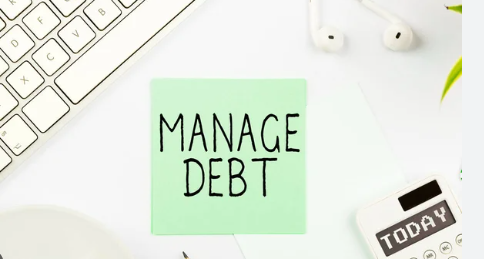Carrying credit card debt can be tough on your wallet. High-interest rates make it hard to pay off what you owe. But, you don’t have to stick with the current rate. By knowing what affects your rate and using smart negotiation tactics, you might get a lower rate. This can help cut down the cost of your debt.
A person holding a credit card and a phone, looking determined and confident as they negotiate with an unseen person on the other end. The background should be simple, with a neutral color palette and no distracting elements. The image should convey the idea of negotiation and successful communication.
Key Takeaways
- Understand how credit card interest rates are determined and the impact of high rates on your finances.
- Gather your financial information and know your credit score to prepare for the negotiation process.
- Effectively communicate your case to your credit card company and be willing to offer alternatives, such as balance transfers or debt consolidation.
- Consider debt management programs, personal loans, or credit counseling services as alternative options to lower your interest rates.
- Maintain a good credit history and continue to negotiate with your card issuer to maintain lower interest rates over time.
Understanding Credit Card Interest Rates
Knowing what affects your credit card interest rate is key to managing your money well. The interest rate on your credit card greatly affects how much you’ll pay back. It’s important for your financial health.
What Determines Your Interest Rate?
Several factors decide your credit card interest rate. Your credit score is a big one. Lenders look at this to see if you’re a good borrower. People with high scores get lower rates, and those with lower scores get higher rates.
How you’ve paid your bills in the past is also important. Making payments on time shows you’re reliable. This can get you a better rate. But, if you’ve been late, you might pay more.
Things like the economy and the federal funds rate also play a part. When the economy is strong and rates go up, credit card companies might raise their rates too. This helps them keep up with the cost of lending.
The Impact of High Interest Rates
High interest rates can really affect you financially. If you owe money on your card, a high rate can make it harder to pay off. It can grow your debt quickly.
High rates can also stop you from reaching your financial goals. You might not have money for saving or big buys. This can hurt your financial stability and happiness.
Understanding what affects credit card interest rates and how high rates can hurt you is the first step. It helps you negotiate better rates and manage your debt better.

A stylized credit card with a magnifying glass hovering over the interest rate section, symbolizing the need for closer examination of the fine print. In the background, a graph or chart depicting fluctuating interest rates to emphasize the importance of negotiation and getting the best deal possible.
Debt management: How to Negotiate Lower Interest Rates on Your Credit Cards
High credit card interest rates can be a big problem, eating into your savings and making debt hard to pay off. But, you can often get lower interest rates by negotiating with your credit card companies. We’ll look at strategies and steps to help you get better terms on your credit cards.
Gather Your Financial Information
Before starting to negotiate, understand your finances well. You’ll need:
- Current credit card balances and interest rates
- Payment history and any late or missed payments
- Credit score and credit report
- Overall debt levels and debt-to-income ratio
Know Your Credit Score
Your credit score affects the interest rates you get. Knowing your score gives you power when talking to your credit card company. If your score has gotten better, use this to your advantage.
Prepare Your Case
With your financial info ready, build a strong case for lower interest rates. Think about these points:
- Highlight your good payment history and credit score
- Show you’re serious about managing your debt and paying off balances
- Compare your current rate to the average or competitors’ rates
- Talk about any tough times or recent rate hikes
With a solid case, you’re more likely to get lower interest rates from your credit card company.
Offer Alternatives
If the credit card company says no to lower rates, suggest other options, like:
- A balance transfer to a card with a lower rate
- A temporary rate cut for a certain time
- A debt management plan or consolidation loan
By looking at these options, you show you’re open to working together and finding a good solution.
An image of a person sitting at a table with a credit card in hand, looking serious while speaking on the phone to negotiate a lower interest rate. The background should feature images of money or financial charts to emphasize the importance of debt management.
Negotiating lower credit card interest rates takes patience, persistence, and a good plan. With the right financial info, understanding your credit, and a strong case, you can often get better terms. Keep going, and don’t hesitate to look at other options if your first try doesn’t work.
Preparing for the Negotiation Process
Before you start negotiating with your credit card company, it’s key to gather all your financial info. You also need to know how important your credit score is. This gets you ready for a successful negotiation.
Gather Your Financial Information
Start by collecting your financial info for negotiation. This means:
- Your current credit card statements, which show your interest rate, balance, and payment history.
- A list of your other credit cards, including their interest rates, balances, and payment histories.
- Your most recent credit report, which you can get for free from websites like AnnualCreditReport.com.
- Proof of any financial struggles or changes that have made paying bills harder.
Know Your Credit Score
Your credit score greatly affects your credit card interest rate. It’s important to understand your score and its impact on your negotiation power. Look into the interest rates for people with scores like yours to guide your negotiation.
With this financial info and knowledge of your credit score, you’re set to negotiate with your credit card company. You can aim for a lower interest rate that fits your financial needs.
Contacting Your Credit Card Company
The first step to get a lower interest rate on your credit card is to contact your credit card company. It might seem tough, but with a good plan, you can get a better rate. The key is to communicate well and know what you want.
When you talk to your credit card company, be polite and professional. Don’t use harsh words or threats, as they can make things harder. Instead, explain your financial situation and why a lower rate would help you.
- Collect all the details about your credit card, like your current rate, balance, and payment history.
- Make a short and convincing argument that shows your good credit history and your desire to keep a good relationship with the company.
- Be consistent but patient in negotiating. It might take a few calls or talking to a supervisor to get a good deal.
The negotiation process is about how you talk and understanding the company’s view. Talk with empathy, be flexible, and know your financial goals. This way, you’ll have a better chance to get a lower interest rate and manage your debt better.
“The art of negotiation lies in understanding the other party’s needs and finding a mutually beneficial solution.”
Effective Negotiation Strategies
When negotiating lower credit card interest rates, having the right strategies is key. By presenting your case well and offering alternatives, you can get a better interest rate from your credit card company.
Present Your Case
To make a strong case for a lower interest rate, gather important financial info and show your payment history. Start by collecting documents like recent credit card statements, payment records, and your credit report. These documents show your financial situation and your commitment to managing your credit well.
Then, talk about how long you’ve been a customer and your good payment history. Show that you’re a reliable customer. This helps the credit card company see your value.
Offer Alternatives
- Propose a temporary interest rate cut for a certain time, like six months or a year. This lets you show you’re using the card responsibly and might get a lower rate later.
- Suggest switching to a credit card product from the same issuer with a lower rate. This benefits both you and the company, keeping your business and offering a better rate.
- Offer to pay more each month or make a big payment to lower your balance. This shows you’re serious about paying off your debt fast.
Good negotiation means presenting a strong case and offering solutions that help both sides. By being cooperative and focused on solutions, you’re more likely to get a lower interest rate and better your financial health.
“Negotiation is not a zero-sum game; it’s an opportunity to explore options and find a mutually beneficial solution.”
Credit Card Balance Transfers
If you’re having trouble with your credit card debt because of high interest rates, a balance transfer could help. Credit card balance transfers let you move your debt to a new card with a lower interest rate. This is often for a special promotional period.
This method can be great for debt consolidation and interest rate reduction. It could save you hundreds or even thousands of dollars in interest over time. By moving your balance to a card with a lower rate, you can pay off the principal balance faster. This means you won’t keep paying just interest.
Benefits of Credit Card Balance Transfers
- Lower interest rates, often as low as 0% for a promotional period
- Simplify your payments by consolidating multiple balances into a single card
- Potentially lower your overall monthly payments, freeing up cash flow
- Provide an opportunity to pay down your debt more quickly
Considerations for Balance Transfers
- Understand the promotional interest rate period and any fees associated with the balance transfer
- Ensure you can pay off the balance before the promotional rate expires to avoid higher interest charges
- Review your credit report and score to increase your chances of approval for a balance transfer card
- Avoid making new purchases on the balance transfer card, as this can negate the benefits
Think about the good and bad of a credit card balance transfer before deciding. It could be a smart way to manage and pay off your debt. Always read the details and compare offers to pick the best one for you.
“A credit card balance transfer can be a powerful tool to help you pay off debt faster and save money on interest charges.”
Debt Consolidation Options
Dealing with debt can feel like a big challenge, but there are ways to take back control. Debt consolidation is one approach that can make managing your payments easier and might even lower your interest rates. Let’s look at two common ways to consolidate debt: personal loans and debt management programs.
Personal Loans
Personal loans can help consolidate your debt. By getting one loan to cover several high-interest credit card debts, you can simplify your payments. This might also give you a lower interest rate reduction. This can save you money and help you pay off debt faster. To get a personal loan, you usually need a good credit score and steady income.
Debt Management Programs
Debt management programs are another choice to think about. These are run by nonprofit credit counseling agencies. They work with your creditors to get you lower interest rates and easier payment plans. By joining a debt management program, you make one monthly payment to the agency, which pays your creditors. This can make paying off your debt consolidation more efficient and might even boost your credit score over time.
| Debt Consolidation Option | Potential Benefits | Considerations |
|---|---|---|
| Personal Loans | Simplified monthly paymentsPotentially lower interest rate reductionFaster debt payoff | Good credit score requiredMay incur origination fees |
| Debt Management Programs | Negotiated lower interest ratesManageable payment plansImproved credit score over time | Enrollment fees may applyTemporary impact on credit score |
When looking at debt consolidation options, think about the good and the bad. Look at your finances and see what’s best for you. Taking action can lead to a more stable financial future.
Credit Counseling Services
If you’re having trouble getting lower interest rates or figuring out debt consolidation on your own, credit counseling services can help. These services offer personalized advice, support, and help in managing your credit card debt. They also help you negotiate with creditors.
Credit counseling agencies are nonprofits that help you make a debt management plan. They talk to your creditors to lower interest rates, reduce payments, and combine your debts into one easier payment. This can help you pay off your credit card debt and take back control of your money.
The process includes these steps:
- You’ll talk with a certified credit counselor about your finances, like your income, expenses, and debts.
- The counselor will help you make a debt management plan tailored just for you. This might mean getting lower interest rates, skipping late fees, and combining your debts.
- The agency will pay your creditors for you each month.
- As you pay, the agency will keep negotiating with your creditors for the best terms and rates.
Using credit counseling services might cost a little each month, but the benefits are big. Working with a trusted agency can boost your credit score, cut your debt, and make you financially more stable.
“Credit counseling services have been a game-changer for me. They were able to negotiate with my creditors and get my interest rates down, which has made a huge difference in my ability to pay off my debt.”
If you’re having trouble with credit card debt and need help, think about contacting a credit counseling service. They can offer the guidance and support you need to manage your finances better and reach your debt goals.
| Benefits of Credit Counseling Services | Potential Drawbacks |
|---|---|
| Negotiation of lower interest rates and feesConsolidation of multiple debts into a single monthly paymentPersonalized debt management planImproved credit score over timeSupport and guidance from certified credit counselors | Monthly fees for the servicePotential impact on credit score during the initial enrollmentLimited flexibility in payment optionsRequirement to close credit card accounts |
Maintaining Lower Interest Rates
Congratulations! You’ve got lower interest rates on your credit cards. This is a big step towards better finances. But, keeping those rates low is the next challenge. It’s all about good credit card management and staying disciplined with your money.
Here are some tips to keep your interest rates down:
- Timely Payments: Always pay your credit card bills on time. If you’re late, you could face higher interest rates, undoing your hard work.
- Avoid Exceeding Credit Limits: Keep your spending below your credit limits. This shows you’re using your cards wisely and helps keep your interest rates low.
- Monitor Your Credit Report: Check your credit report often for errors or unauthorized activity. This can affect your credit score and your interest rates.
- Limit Credit Card Applications: Don’t apply for too many credit cards at once. This can hurt your credit score and make it harder to get lower interest rates later.
- Maintain Financial Discipline: Stick to a budget and use your credit cards only for what you really need. Avoid buying things on impulse to prevent getting into more debt.
By following these tips, you can keep enjoying lower credit card interest rates. Remember, managing your credit cards well is an ongoing task. But, the benefits of lower rates and better finances are worth it.
| Factors Affecting Interest Rates | Impact on Maintaining Lower Rates |
|---|---|
| Payment History | Always pay on time to avoid higher rates and show you’re responsible. |
| Credit Utilization | Keep your credit card balances low to keep good interest rates. |
| Credit Score | Watch and improve your credit score for better rates in the future. |
| Credit Inquiries | Apply for fewer credit cards to keep your credit profile strong. |
| Financial Discipline | Stick to a budget and spend wisely to keep your rates low. |
Focus on these key areas to maintain lower interest rates, manage your credit card debt, and build financial discipline. This will lead to a stable and prosperous financial future.
“The secret to getting ahead is getting started. The secret to getting started is breaking your complex overwhelming tasks into small manageable tasks, and then starting on the first one.”
Conclusion
In this guide, you’ve learned how to negotiate lower interest rates on your credit cards. You now know the factors that affect your rates and how they impact your finances. This knowledge lets you take steps to reduce your debt and save money.
Debt management strategies like talking to your credit card company, using balance transfers, and looking into consolidation can help. These methods can improve your financial situation. It’s important to stay disciplined and make smart choices for long-term financial health.
Using these negotiation strategies will not only lower your credit card rates but also boost your financial health. By managing your debt well, you gain more financial freedom and peace of mind. This leads to a brighter financial future.
FAQ
What determines my credit card interest rate?
Your credit card interest rate depends on your credit score, payment history, and the market. Lenders look at these to see how risky lending to you is. This risk affects the interest rate they offer you.
How do high interest rates impact my debt burden?
High interest rates make your debt more expensive. You pay more in interest, so less of your payment goes to the principal. This makes paying off your debt harder and can lead to more debt and stress.
What steps should I take to prepare for negotiating a lower interest rate?
Get ready by collecting your financial info like credit card statements and your credit score. Knowing your finances and credit can help you make a strong case for a lower rate.
How do I effectively communicate with my credit card company during the negotiation process?
Be polite, professional, and keep trying when you talk to your credit card company. Explain your situation and show you’re a good customer. Offer payment options or a balance transfer to increase your chances of getting a lower rate.
What negotiation strategies can I use to secure a lower interest rate?
Show you deserve a lower rate by highlighting your good payment history and credit score. Consider paying a lump sum, increasing your monthly payment, or moving to a card with a lower rate. Showing you’re willing to work with them can help.
How can a balance transfer help me reduce my interest rates?
Moving your balance to a card with a lower rate can save you money and help you pay off debt faster. Many cards offer 0% APR for balance transfers, giving you a break and letting you focus on the principal balance.
What other debt consolidation options are available to me?
Besides balance transfers, you can look into personal loans or debt management programs. Personal loans give you a fixed rate and a clear plan to pay back. Debt management programs negotiate with creditors for lower rates and easier payments.
How can credit counseling services assist me in managing my credit card debt?
Credit counseling services offer guidance and support in dealing with credit card debt. They help you understand your finances, negotiate with creditors, and create a debt plan to take control of your money.
What steps can I take to maintain lower interest rates on my credit cards?
Keep lower rates by paying on time, watching your credit score, and avoiding new debt. Check your statements and talk to your lenders to make sure your rate stays low.







